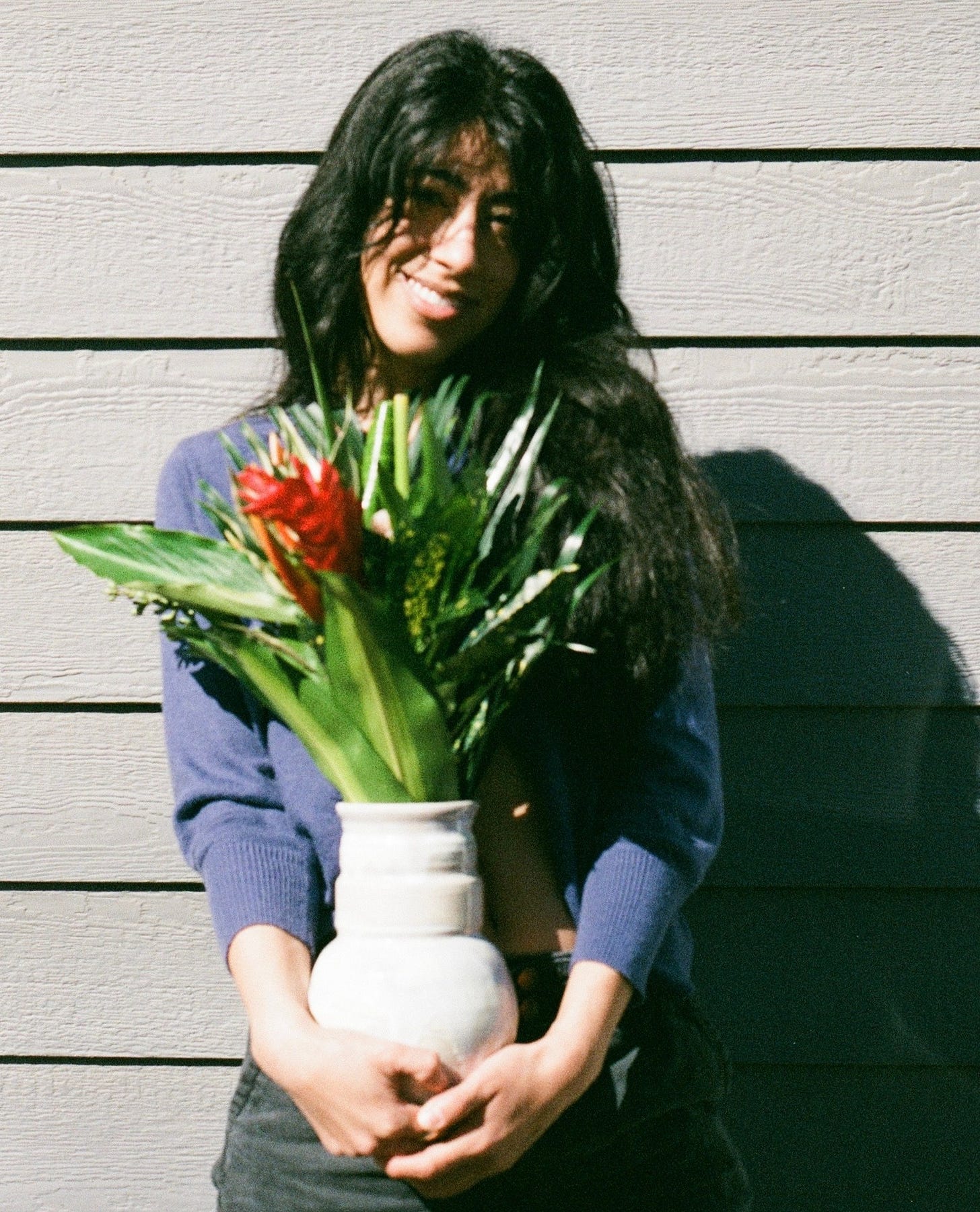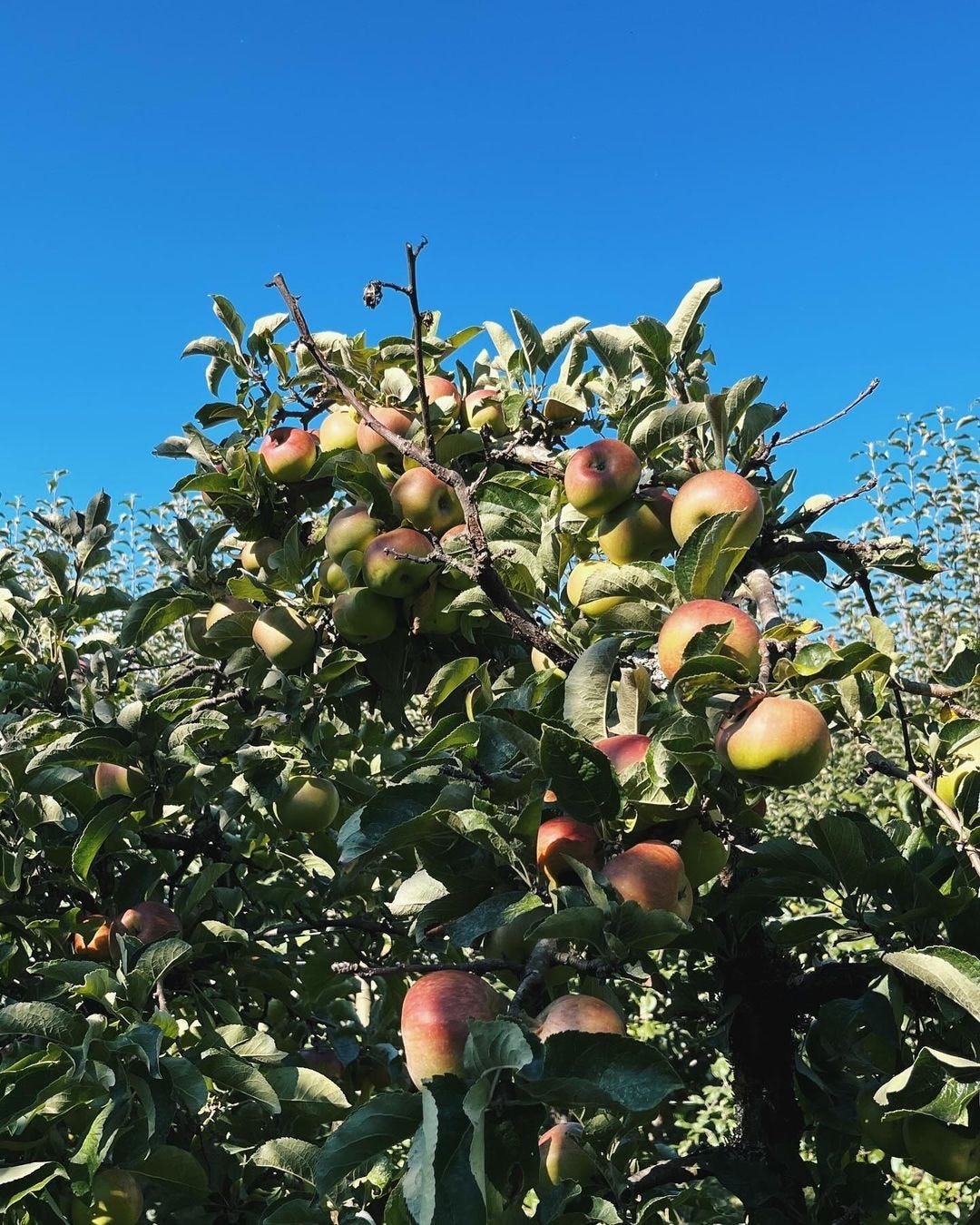I didn’t grow up going on ski trips or spending summers at the lake. Adventure, for me, looked like a soft-serve cone from the gas station or a walk along the Provo River at dusk. Most days moved in quiet loops: chores, school, dinner. Nothing that would catch most people’s eyes. In that repetition, something happened, my street became a place of study:
a neighbor washing his car with the hose,
music drifting out of garages as another neighbor swept,
rugs draped over porch railings to air out.
It was all ordinary, but the longer I looked around me, the more texture I found…
the taste of saltines with buttery cheese and mesquite honey, our go-to dessert,
my parents’ singsongy “BUENOS DIAAAAS” on slow weekend mornings,
the neighbor’s lilies spilling over our fence in early May,
the collared dove’s soft “hoo hoo” at dawn, and the magpie’s “chak chak” throughout the day.
A Wild Woman On the Hill
Up the hill lived Josefina, a seventy-something woman in an unkempt stretch of land, about three or four acres, tucked behind a sagging run of barbed wire fencing. To me, it was another world. Horses, chickens, ducks, geese, cats. Trees heavy with plums, apples, pears, and apricots. And a peacock whose morning and evening cries were the reward for being outside at such hours.
Her place stood out in a working-class neighborhood where sameness reigned in the way suburbia often does: predictable and restrained. A place where nothing was meant to call too much attention.
Josefina’s land disrupted that.
From the outside, it looked wild. Think: overgrown grass, rusted tools leaning against trees, and the roof in its last days. Her house sat in the center of it all, tucked among the trees you could barely spot it. Only those who had earned Josefina’s trust had access to her oasis.
Josefina was wonderfully odd. A small, snow-haired woman with black hairs sprouting from the sides of her lips in bold defiance, as if daring you to mention them. Her earthy, no-nonsense forthrightness reflected a long life spent working the land. She often spoke with a certain urgency, like she was trying to unspool the whole thread of her life before time caught up with her.
She once mentioned that she was from Basque by way of Nevada. How she ended up in Utah, I’m not sure, but she was proudly not by the book in any way. She was a Sunday Catholic in a predominantly Mormon neighborhood, weaving in poor Spanish here and there, cackling at her own jokes like someone long used to living alone.
She rarely asked for help, but when she did, it seemed like she knew it gave us a way to feel useful. A way to feel close. Like the time she handed me her phone book and said, “Help me find so-and-so’s number,” and when I pointed to a name, she waved her hand and said, “No, not that one—he’s dead. You can cross him out.” Or when she had us brush her dog’s hair on the porch, insisting it was a whole ordeal, though the dog barely moved, sweet as anything. The tasks didn’t matter. What mattered was the exchange: her letting us in, and us feeling like we had something to give.
My parents easily recognized a woman without pretense, likely because they’d grown up around people like that themselves. In our world, things were kept clean, but never for show. Josefina and her yard weren’t trying to impress anyone. They were practical, full of soul, and entirely themselves.
Though we lived in a modest neighborhood, we had colorful neighbors like Josefina who gave the place character. She’d let us pick fruit in buckets to make jam and, once or twice, even gifted us a duckling to raise. I hadn’t grown up with grandparents nearby, so her company felt like its own kind of inheritance. Her place gave us hours of escape from the pressures of school or whatever waited at home. It was a nature’s retreat, and just a quick block away from home!
When Josefina died, her family sold the land fast.
The trees were cleared, the ground leveled, and in their place came rows of houses that all look the same.
Her wonderland was gone. And my childhood street, once full of texture and small, strange joys, became a suburb like any other.
Like the new inhabitants of the homes where Josefina’s estate once stood, they’ll never know the land they’re sitting on. I’d walk by and call a house “the chicken coop house” or “the plum house” as a reminder of what was once there. They’re seeing something different, something I may never understand. That memory gap is neither their fault nor mine. Still, it reminds me how easily a place can be wiped clean of its past, and how disorienting it is to be the one who remembers the magic that was once there.
For a long time, I didn’t know how to talk about what I lived because it no longer exists, and because I didn’t understand it was rare.
Learning to Value My Upbringing
Despite the wonderland I described earlier, the reality is that my upbringing didn’t feel like enough for many years. My parents did everything they could to make life feel full, but our lives didn’t seem to measure up to the standard of normalcy I saw in my peers at school. They had bigger homes, with parents who made them cookies and didn’t speak broken English. I was ashamed. Instead of inviting friends over, I would tell them I’d go to their house instead for fear that they wouldn’t be able to see the magic I saw in my neighborhood and home.
I didn’t know how to name what I was seeing, but I caught the slow beauty, the odd details, the small rituals. It’s taken me years to understand that kind of noticing as a gift. A form of inheritance shaped by my parents, by people like Josefina, and by a landscape that asked nothing of me except to look. Now, I am recognizing the power in sharing what I’m seeing and in inviting others to do the same.
Reclaiming this gift of noticing has taken time. Conversations with friends, therapists, and family have helped me understand what I carry: an ability to find beauty in the small and overlooked. I did grow up in magic. It may not have looked like the childhoods I once envied, but it was no less worthy of praise.
I’ve also come to see the privileges we did have and how that shaped me, too.
Yes, we lived in a modest neighborhood by most U.S. standards, but my parents were always improving what we had (my dad out of practicality, my mom for beauty).
My parents stayed together and were in love, and that alone gave our home a kind of steadiness I now see as rare.
They worked a lot, but I never lacked their attention when I needed it most.
We didn’t travel, but we also didn’t have to move constantly like other families.
I read Kafka and Cervantes to my dad as a kid; that’s how I first traveled, and how I learned to love words.
And it was my mom who taught me how to write my emotions: we butted heads often growing up, and funnily enough, that led to a series of angry letters, apology letters, and love letters exchanged between each other.
I can’t fully say whether it was my upbringing or my nature that shaped this way of seeing, but either way, it has colored how I move through the world.
It can be a exciting (and isolating) to notice so much. Josefina’s home may be gone, but it instilled in me this unique way of seeing the world, of finding beauty in what others might otherwise see as a lost cause. That seems to translate not only in how I see things but also in how I aim to see people. Why someone thinks the way they do. What makes them light up. What makes them cry.
What Class Has to Do With It
Remembering my childhood with more tenderness has opened 3 key questions that I’ll be exploring with you in the next few essays:
How do I connect with people who see the world in different ways than I do?
What is richness, really?
What do us humans need in this day and age to feel rooted in our lives?
It’s clear we each carry invisible field guides shaped by class, culture, and the tempo of our early lives, but few of us are taught to name them, let alone talk about them.
I’ve spent most of my life avoiding class by sidestepping the discomfort, staying quiet when something didn’t land, shrinking when I felt out of place. Class made me feel small. It made me feel like I didn’t have the right words, or that if I said the wrong thing, someone would see me for what I lacked. I still feel that way sometimes. Still find myself freezing when the room shifts and I can’t find a way in.
But it isn’t our fault how we were raised, what privileges we have or don’t have. What is our responsibility, though, is what we choose to do with that awareness.
I want to create room for curiosity for stories that say, “This is where the richness comes in my life. This is why I am the way I am. And this is how I can meet you where you are.” Not from a place of comparison, but of connection.
I don’t expect it to be perfect, but I do hope it’s honest.
My hope is that when we place those field guides side by side (mine of rhythm, someone else’s of novelty), we open space for a kind of understanding that neither of us could reach alone.
Will you join me on this exploration?
Next post, I’ll be exploring how class shows up in friendships!
Until then, mucho amor (much love),
Flor
Beautiful prints by Rosie Harbottle. This one is lovely.
I think I understand the hype of Emma Chamberlain now.
This podcast feels like a friend hangout.
A book on dying by a death doula, recc’d by my therapist with impeccable taste.
Living the questions - poem shared by my wonderful grief tending mentor, Nici.
Everyone I know is worried about work. Speaking of, would you take a micro retirement?
12 women on living alone.
Saving this list of 30 best fiction books of the last 30 years. And these books for better storytelling.
Lenny Kravitz’ home tour(!)— also how he speaks about his mom is endearing.
If you enjoy reading Que Onda, there are a few ways to let me know: “like” this post, leave a comment, reply to this email, or share with a friend. I read every single comment and subscriber note. Thanks for being here!








This was such a beautiful read, as they always are :) love you! and your heart!!!
Oh justo estaba pensando en ti esta manyana, muy feliz de poder leerte. Gracias por compartir de corazon, te mando un abrazo muy grande Flor